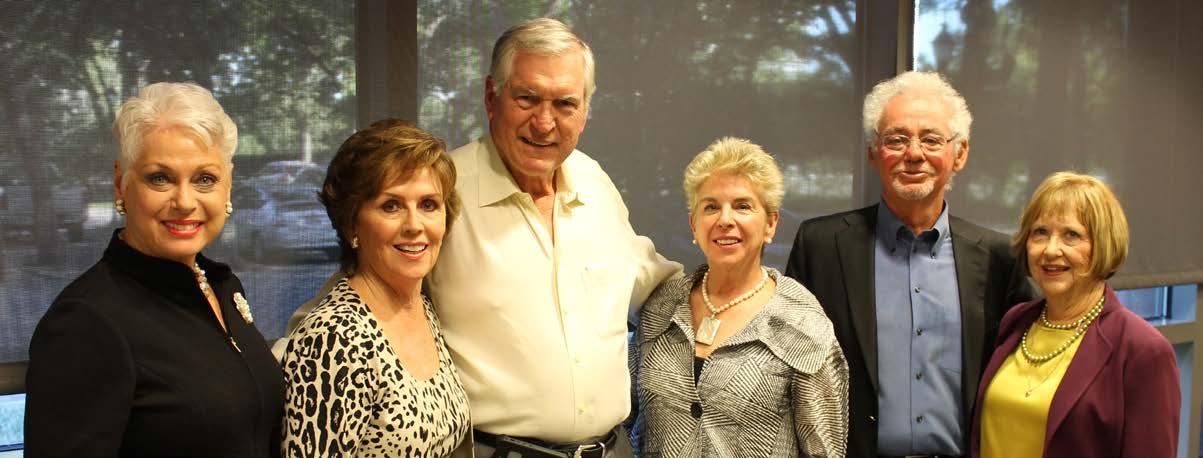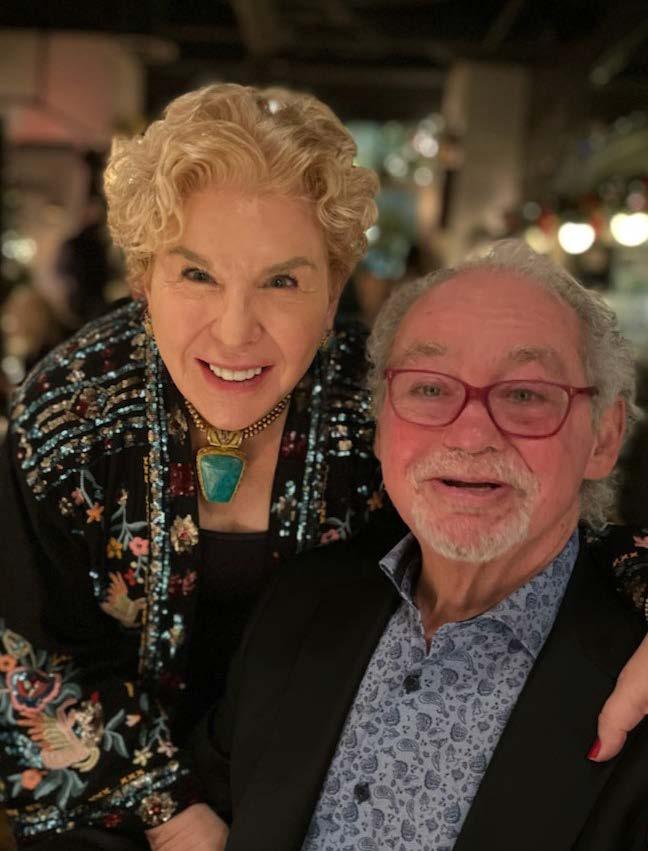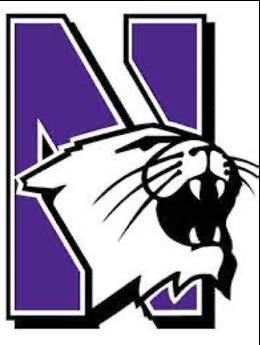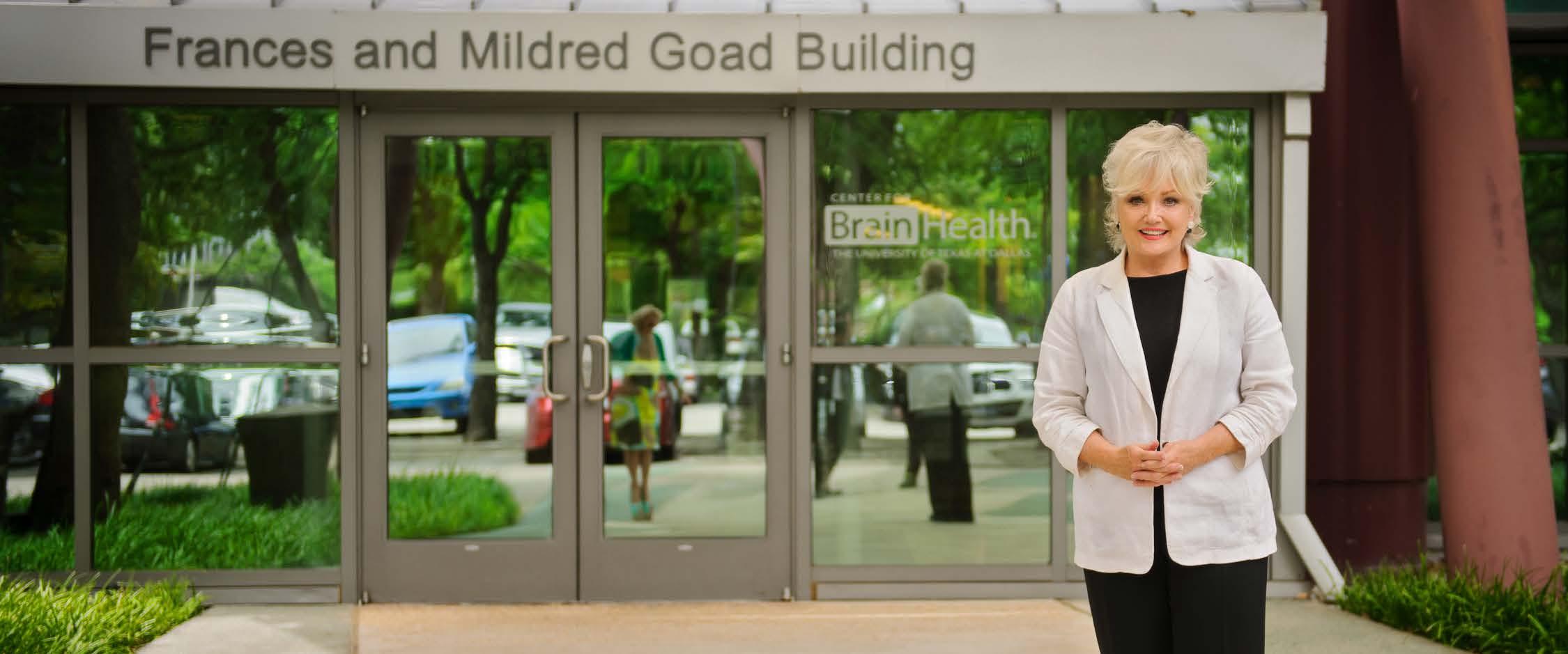That introduction launched an ongoing relationship and generous support that spans many pivotal milestones and initiatives, including the capital campaigns for BrainHealth’s research- and performancefocused buildings. In 2014, Bert established the Lt. James A. Gardner Warrior Scholarship Fund to provide BrainHealth’s SMART™ Brain Training to veterans, in memory of a high school friend who died in the Vietnam War. And for North Texas Giving Tuesday Now in 2020, Bert and Cindy offered a lead matching gift to fuel BrainHealth’s resilience programs for local front-line workers at the height of the pandemic.
“The Center for BrainHealth produces results and is on the cutting edge of brain health universally,” Bert said. “This is an organization that’s ‘boots on the ground’ making a difference in people’s lives.”
EXPAND ACCESS TO BRAIN HEALTH
Your gift to the Center for BrainHealth will allow individuals from under-resourced communities in Dallas to learn life-changing strategies necessary to improve their brain health and develop healthy lifestyle behaviors, leading to greater employment opportunities, higher educational attainment, and an enhanced overall quality of life amid these difficult times.
Thanks to the generosity of Laurie and Todd Platt, all gifts totaling up to $33,000 will be matched, doubling the impact of your support.
SEPT. 1–23
MAKE YOUR TAX-DEDUCTIBLE GIFT AT NORTHTEXASGIVINGDAY.ORG

search “Center for BrainHealth”
Donors Extend 16-year History of Support by Funding Critical New Research

A first-of-its-kind study is launching, thanks to a gift from Cindy Thomas and Bert Headden, to measure the effects of hormone replacement therapy on cognitive performance in women. The results could help unfold scientists’ understanding of why two out of three Alzheimer’s disease patients are women.
CRITICAL RESEARCH QUESTIONS
Hormone replacement therapy (HRT) has been shown to alleviate many of the negative symptoms commonly experienced during menopause –improving cognitive function and sleep patterns and lifting anxiety and depression.
What remains to be understood is the impact of HRT on the brain’s executive functions, such as strategic thinking and innovation, and their relation to core factors of brain performance such as resilience (purpose and social connectedness), clarity (reasoning, optimism, problem-solving), and fortitude (emotional balance in the face of adversity, happiness).
EXPLORING CHANGE
Thirty post-menopausal women will participate in a sub-study of The BrainHealth Project. They will establish a baseline measure of their brain’s fitness by getting their online BrainHealth Index. They will then begin HRT in collaboration with Dr. Terri DeNeui, founder of EVEXIAS Health Solutions. They will repeat the BrainHealth Index after six months and one year, with an individualized coaching session at the one-year mark to discuss Index changes over time.
Cindy explained, “I use hormone replacement therapy and feel that it has made a big difference in my quality of life. A study of this kind hasn’t been done before, and see it as a steppingstone that

will be useful for women, and perhaps eventually men. Gender differences are a valuable part of looking at brain health, and we’re excited it’s happening.”
GENEROSITY THAT MATTERS
The concept of brain health fits right in with Cindy’s background as a physical therapist, including starting the equine physical therapy program at Equest. Bert’s interest in brain health dates back to his first wife’s passing away from a degenerative brain condition. When he and Cindy were first introduced to the Center for BrainHealth, he had just sold a business after a career working with venture capital firms and was looking to spend his retirement involved with nonprofits where he could make an impact.
continued on back cover
Pg 2 INSIDE THIS ISSUE Brain Matters 2021 Q2-3 page 1 2ND & 3RD QUARTER 2021 BvB Dallas Funds Study The Power of Imaging Data 108 Dallas, TX
Pg 4
Pg 3 BrainHealth Project Summer Scholars Reaching Under-resourced Texans Dianne Cash Fellowship Recipients An Informed Discussion on Addiction and Public Health
Cindy Thomas and Bert Headden
Donors, continued from front cover
(L to R) Barbara Horn, Biddie Jordan, Lee Roy Jordan, Cindy Thomas, Bert Headden, Joella McManus (Lt. Gardner’s widow)
TO LEARN MORE ABOUT WAYS YOU CAN SUPPORT BRAINHEALTH'S NONPROFIT MISSION, CONTACT: Julie Heckmann , Assistant Director of Development | 972-883-3277 | julie.heckmann@utdallas.edu
INSPIRING THE NEXT GENERATION TO BE AGENTS OF CHANGE
The Center for BrainHealth offered 15 STEM undergraduate and graduate students from universities across the country the opportunity of a lifetime through a hands-on, cross-discipline summer internship.

The BrainHealth Project Summer Scholars learned about the latest groundbreaking advancements in brain health through a series of interactive sessions with BrainHealth experts. They discussed ways to take charge of their own brain fitness by leveraging the principles of neuroplasticity and learning strategies to improve clarity, resilience, and fortitude. And they shared insights to make brain health relevant to their peers.
“People our age underestimate how much they can do for their own brain. My BrainHealth Index helped me realize that even though I don’t feel like my brain is unhealthy, there’s always room for improvement,” shared Vivek Nair, a healthcare studies/pre-med student at UT Dallas.
“I learned that a little bit of investment, starting now, has big payoffs down the road. In 20 years, I don’t want to look back and think, ‘Why didn’t I do that?’,” said Matthew White, a math and neuroscience student at UT Dallas.




For their final presentations, the Summer Scholars translated academic articles into lay-friendly language, created appealing visuals for social
media, and produced a heat map of the U.S. to reveal that the Project includes participants from 48 states. The presentations showcased the degree to which the students internalized the training and started incorporating the lessons into their own lives.


The Summer Scholars participated in a robust curriculum of conversations with BrainHealth experts, including the newly arrived Dr. Yune Lee. Jessica Herlitz shared this perspective following his session: “Being a musician myself, I was particularly inspired by Dr. Lee and his research on the intersection of music and the brain. It is encouraging to see how music has the possibility to aid in rehabilitation in language function and improve brain health of people in all walks of life.”
Generating Magnitude with Light Bulb Moments
BRAINHEALTH PROJECT REACHES 48 STATES

Lisa Simmons, President of the Harold Simmons Foundation, said, “We seek to improve the quality of life of all members of our community. We are proud to support The BrainHealth Project’s efforts in ensuring underserved individuals have the tools they need to improve their brain health and increase their capacity for thriving in all aspects of life.”
MARCO LOPEZ
“Change of mindset comes into play with underserved communities. Sometimes people have internalized the idea that ‘I’m not smart,’ maybe from schools or experiences. We can instill optimism when people understand the brain is adaptable.”


STACY VERNON
Thanks to a gift from the Harold Simmons Foundation, local patron of large-scale change, The BrainHealth Project has begun leveraging community partnerships to develop and deliver enhanced, more inclusive training to under-resourced Texans. A key step has been to hire a new BrainHealth coach, Marco Lopez.

“With key tools they learn through the Project, people can see themselves as active players in their own brain health and chart a strategic course out of poverty.”
MARCO LOPEZ
“Talking to a coaching participant, something clicked. He realized brain fitness applies to him even though he’s not working a regular job. That little light bulb came on.”
STACY VERNON
“Seeing those lightbulb moments is so helpful. We’re exploring group coaching to build community and support an iterative process of refinement and feedback.”
MARCO LOPEZ
“Having previously worked in skilled nursing to help slow decline from strokes, brain injuries and dementia, the Project has helped me expand my thinking. Our training uses positive mindset. Here’s your baseline, where you are right now. You have possibilities from there.”
STACY VERNON
“We are thrilled that Marco is helping our team expand our reach, and both coaches and participants are already benefiting from his active involvement.”

We were blown away by the energy, intelligence, innovation and dedication of this group – their contributions are helping us in our mission to change the world.
Dr. Sandi Chapman, PhD
Brain Matters 2021 Q2-3 page 2
Chief Director, Center for BrainHealth
L to R: Jessica Herlitz, Divya Prabhakaran, Vivek Nair, Sruthi Atluri, Aayush Srivatsa (back), Shradda Uppu (front), Jhanani Taspa, Masuma Firoz, Matthew White, Krisha Atreya, Cassidy Keelen, Audra Miller, Brittany Davis (Not pictured: Jonathan Foster, Stephen Ling)
Stacy Vernon and Marco Lopez
BrainHealth Summer Scholar, Jonathan Foster, developed this heat map showing The BrainHealth Project has participants in 48 states.
BvB Dallas Kicks Off Care Partner Study
BvB Dallas, a long-time BrainHealth supporter, will help launch a 2022 study benefitting care partners and people with a diagnosis of Alzheimer’s or mild cognitive impairment. Utilizing the BrainHealth Project platform, this study will measure and support brain health among care partners, a group at increased risk of cognitive decline.
The young professionals of BvB Dallas raise funds and awareness to honor loved ones with Alzheimer’s. BvB’s gifts to the Center for BrainHealth since 2014 have exceeded $780,000.

Members of BvB recently met for a special educational presentation about BrainHealth.
“I am always impressed by the questions asked by BvB members,” said Audette Rackley, Assistant Director of Strength-Based Programs. “They realize we need to think about our brain before something goes wrong – decades before.”
BvB Co-president Holley Caldwell added, “BvB Dallas is in awe of the amazing work being done at the Center for BrainHealth and so honored to partner with you in our fight to #TackleAlz. We believe that the BrainHealth Project is integral to maintaining and improving our cognition, which will be of the utmost importance for generations to come. Thank you for all that you do!”
WHY I SUPPORT BRAINHEALTH
I discovered UT Dallas’ Center for BrainHealth while seeking out local resources to assist with a family member’s diagnosis of Alzheimer’s in 2007. I was residing in Boston at the time, but was impressed with the research and passion I encountered, and how the Center was looking to improve our brains before disease strikes. Now living in Dallas, I serve on BrainHealth’s advisory board and have included the Center in my estate plans, which ensures support of the research well into the future. Additionally, I support the Friends of BrainHealth program that funds emerging scientists that develop novel, transformational research.
Semra

BrainHealth donor since 2008
Young Professionals Support BrainHealth Project
Your free webinars were life-saving this year. As a result, I took the leap and joined your BrainHealth Project. Loving it. Thank you!
Patti Croop, first-time donor (online)

Leveraging
the Power of Imaging Data
In 2017, I was elated to be appointed to the Jane and Bud Smith Distinguished University Chair. Jane and the late Bud’s visionary support allows us to continue making discoveries in brain health. My research is exploring ways to analyze and integrate brain imaging data to identify healthy and disordered brain markers.
At the UT Dallas BrainHealth Imaging Center, we are developing software to establish a research network for leveraging and acting on multimodal imaging data
Dr. Vince Calhoun
from around the world. The equipment used to generate the data for this remarkable work can costs millions; however, Jane and Bud’s generosity allows these lines of research to flourish. I believe the ability to convert neuroimaging data quickly into useful information is a critical step in allowing it to impact the life of an individual.
I am beyond honored to be an endowed chair and researcher – it makes this type of work not only possible, but exciting!
Jane and Bud Smith Distinguished University Chair, Center for BrainHealth
BrainHealth's young professionals circle, the Think Ahead Group (TAG), donated $10,000 to bring The BrainHealth Project's strategies to emerging adults.

Mary Anne and her late husband, Dick, were introduced to the Center for BrainHealth after their then 48-year-old daughter suffered a brain aneurysm, followed by a coma and multiple strokes. Through this experience, they became champions of brain health awareness and generously donated to help establish

BrainHealth’s dedicated research facility.
Mary Anne remained a loyal annual BrainHealth supporter for 15 years, in addition to the many ways she was a philanthropic pillar of Dallas.

Mary Anne was an incredible businesswoman and exemplified class inside and out; she was always perfect. In fact, the last time I saw her, she was wearing leather pants – I’ll never forget that! She advanced BrainHealth at each aspect and transformed every corner of this city.
Dr. Sandi Chapman Chief Director, Center for BrainHealth
page 3 Center for BrainHealth
IN MEMORIAM
MARY ANNE SAMMONS CREE 1930 – 2021
This is the energy we need to change the narrative around the brain for future generations.
Dr. Julie Fratantoni Head of Operations for The BrainHealth® Project
photo courtesy of Andrew Devereaux
L to R: Katelyn O’Donel, Tucker Robinson, Kendal Dodge, Emily Wingate, Kristen Jackson, Kathryn Simmons, Bora Laci
Treece,
Dr. Vince Calhoun, Jane and the late Bud Smith
Fellowships Help Launch Careers in Science
One of the most impactful contributions BrainHealth makes to science is in shaping the next generation of scientists, and donors are critical to this endeavor. A prime example is the Dianne Cash Fellowship, which has been funding exemplary graduate students pursuing their doctoral degrees since 2012.

CURRENT AND PAST RECIPIENTS DISCUSS THEIR WORK:
“The support I received from Dianne Cash has been tremendous in preparing my dissertation project. My project focuses on the psychological underpinnings of confirmation bias – the reluctance to change one’s mind by over-emphasizing evidence that supports one’s beliefs while undervaluing contrary evidence. In the wake of the COVID-19 pandemic, disinformation stemming from social media platforms has threatened to undermine public health advisories and safety guidelines aimed toward mitigating the pandemic, which can be linked back to confirmation bias. I am optimistic that the results of this work will inform how we can begin to ameliorate the effects of disinformation online”.
MICHAEL LUNDIE, MS
“I feel extremely fortunate to have been selected to receive the Dianne Cash Fellowship. It is an honor, and it allows me to grow as an independent scientist. I am excited to begin a behavioral study to understand the relationship between mindfulness levels of an individual and their cognitive abilities. Results from this work will inform our understanding of the mechanisms involved in cognitive well-being and how mindfulness contributes to it.”
GAYATHRI MARUTHY, MS
“I have always had a deep interest in understanding the basic questions of the human brain and aging. My current work is using cutting-edge brain imaging to study the effect of aging on cognition
and brain physiology. This technology enables me to investigate how brain cells communicate their nutrient requirements to blood vessels when they are firing, one of the most crucial functions in our brain that has not been studied before in humans. Receiving the Dianne Cash Fellowship was critical for me at this juncture in my career.”
IRENE ZHAO, MS
“I use neuropsychological and advanced neuroimaging techniques to elucidate the cognitive processes and neural correlates of learning and memory. I am seeking to better understand how multiple sclerosis (MS) disease progression can affect cognition, and to aid in the development of effective treatments. Receiving the
Dianne Cash Fellowship award has allowed me to present my research at national and even international conferences. I want to thank Dianne Cash for her generosity and dedication to helping young scientists develop into independent researchers.”
MARK D. ZUPPICHINI, MA
“My dissertation project is measuring how first impressions of a person influence a participant’s decisions on how trustworthy or dishonest that person appears. My research interests also include face perception, deception, and artificial intelligence. Additionally, I am excited to pursue research to train artificial intelligence models to detect patterns of deception in behavioral and functional magnetic resonance imaging data. I want to thank Dianne Cash for supporting my development as a young researcher, allowing me to do work that I plan to publish in an academic journal.”
JELENA RAKIC, MS
“My research during my time as a doctoral student focused on speed of thought, brain changes in multiple sclerosis patients, and the support system that coordinated the delivery of nutrients to brain cells. The Dianne Cash Fellowship allowed me to integrate these three topics into a single project, and to present and publish this work – the first to show that a relationship exists between the health of this nutrient delivery system and the extent to which thinking was slowed in multiple sclerosis sufferers. I am extremely grateful to Dianne Cash for endowing me with this fellowship that was truly instrumental to advancing my career.
Promoting an Informed Discussion on Addiction and Public Health
As the Bert Moore Chair in BrainHealth, my mission is to create an intersection between science and public health.
I direct Cognitive Neuroscience Research of Addictive Disorders at the Center for BrainHealth, where my lab investigates brain and behavioral dysfunction related to reward and motivation – exploring biomechanisms involved in disorders that stem from substance use.

I am passionate about providing evidence-based knowledge that could contribute to informed public health policies for
prevention and intervention. One example is the need to address the critical gap between scientific knowledge, public opinion and legislation surrounding the impacts of cannabis on health and behavior.
By generating accessible information on the neuroscience of addiction, we empower people to make more informed decisions for the benefit of public health and safety.
Generous funding from the Bert Moore Chair, along with gifts from UT Dallas alumni and other supporters, allows my lab to continue ensuring that addiction science advances and forms part of the conversation.
 Dr. Francesca Filbey Bert Moore Chair in BrainHealth, Center for BrainHealth
Dr. Francesca Filbey Bert Moore Chair in BrainHealth, Center for BrainHealth
Brain Matters 2021 Q2-3 page 4
Dr. Sandra Chapman, the late Dr. Bert Moore, Dr. Francesca Filbey, Dr. Lynne Kirk
Dianne Cash
FIND OUT HOW YOU CAN SUPPORT EMERGING SCIENTISTS! CONTACT: Julie Heckmann Assistant Director of Development | 972-883-3277 | julie.heckmann@utdallas.edu
MONROE TURNER, PHD
L to R: Monroe Turner, Irene Zhao, Michael Lundie, Jelena Rakic, Mark Zuppichini, Gayathri Maruthy
























 Dr. Francesca Filbey Bert Moore Chair in BrainHealth, Center for BrainHealth
Dr. Francesca Filbey Bert Moore Chair in BrainHealth, Center for BrainHealth